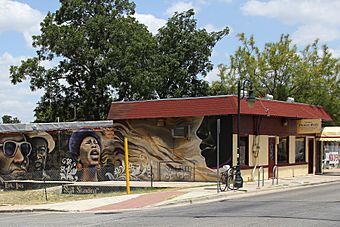Victory Grill facts for kids
|
Victory Grill
|
|

The Victory Grill in 2011
|
|
| Location | 1104 E. 11th St Austin, Texas, USA |
|---|---|
| NRHP reference No. | 98001226 |
Quick facts for kids Significant dates |
|
| Added to NRHP | October 16, 1998 |
The Victory Grill is a special music spot located at 1104 E. 11th Street in Austin, Texas. This historic club was once part of the "Chitlin' Circuit," a group of venues where famous African American performers could play during a time when many places in the United States were legally separated by race. Big names like Bobby Bland, Clarence "Gatemouth" Brown, W. C. Clark, and B. B. King all performed here. The Victory Grill was officially added to the National Register of Historic Places on October 16, 1998, recognizing its important history.
Contents
A Place for Music and History
Starting the Victory Grill
Johnny Holmes, who helped musicians find places to play and managed bands, opened the Victory Grill on Victory over Japan Day in 1945. He started it as a restaurant and a place to get drinks for black soldiers coming home from World War II. In the 1940s, many places in the southern United States were segregated, meaning black people and white people had to use separate facilities. Because of this, these returning soldiers couldn't just go into any place they wanted. The first Victory Grill was a small building, but Johnny Holmes soon moved it to a bigger spot next door.
The Golden Age of Music
Johnny Holmes knew a lot about the growing Texas blues and jazz music scenes. Soon, the club became famous for its amazing music, as well as its food and drinks. People who loved music, no matter their race, started coming to the Victory Grill. In the 1950s, which was its most popular time, many of the top national blues, rhythm and blues, and jazz artists who visited Austin played at the Victory Grill.
Some of the incredible artists who performed on its stage included Ike & Tina Turner, James Brown, Etta James, Billie Holiday, Chuck Berry, and Janis Joplin. One person who lived nearby later said that the street was so full of people, it was hard to walk, like a big party in New Orleans.
Changes and Challenges
In 1952, Johnny Holmes rented out the Victory Grill and traveled for a while. When he came back in 1965, he was surprised to see how much the area had changed. Laws that ended segregation meant that many African American families could now move to the suburbs. Also, because places were no longer segregated, the "Chitlin' Circuit" was no longer needed, as musicians could now play in many other venues.
These changes meant fewer people were coming to the Victory Grill. This led Johnny Holmes to close the music part of the club in the mid-1970s. However, he kept the restaurant open because the Victory Grill's food was still very popular.
Bringing Music Back
On Juneteenth weekend in 1987, East 11th Street became lively with music again. A big reunion party brought many of the Victory Grill's former musicians and fans back together. However, the Victory Grill closed again for a time after October 10, 1988, when it was badly damaged by a fire that started in a building next door.
For several years, many groups tried to raise money and support to reopen the Victory Grill, but it was difficult. Finally, in 1995, R.V. Adams, a friend of Johnny Holmes, started working to restore the building. The club officially reopened in 1996. This helped bring new life to the area, which had been struggling.
Victory Grill Today
The Victory Grill is one of the last original "Chitlin' Circuit" music clubs still standing. It is listed on the National Register of Historic Places and is recognized by the Texas Historical Commission. It has also been called a "Texas Treasure" by Preservation Texas, a group that works to save historic places.
The Victory Grill is an important reminder of how American music traditions developed. Its restoration helped connect the music of the past with today's urban contemporary sounds. The café serves delicious southern cuisine, and the venue hosts blues, jazz, and urban contemporary entertainment. It also offers educational programs that teach about African American music and culture from the past and present. Today, the Victory Grill is open for private events, educational visits, and cultural tourism.
 | Aaron Henry |
 | T. R. M. Howard |
 | Jesse Jackson |

